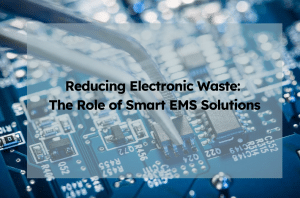The EMS industry has been long forming the backbone in the global electronics supply chain for several years, helping numerous companies to contract out manufacturing to reduce costs and concentrate on their core competencies. The necessity for quicker time-to-market, the emergence of IoT, and the growing complexity of electronic devices are all contributing factors to the EMS industry’s notable growth. This blog explores the current situation of consumer adoption in the EMS industry and the future market potential that the industry would bring forth. It considers the contribution of specialized services, such as PCB box build assembly services and PCB assembly services, towards shaping this growth.
Current Consumer Adoption of EMS
Consumer adoption of EMS has been steadily increasing as businesses recognize the benefits of outsourcing manufacturing processes. The main segments of demand for the EMS market include consumer electronics, automotive, and telecommunications, requiring complex, qualitative, and cost-effective solutions in manufacturing.
PCB assembly services are among the essential services provided by EMS companies. It involves the assembly of printed circuit boards, which actually constitute the backbone of electronic devices. With every advance in technology, the demand for sophisticated PCB assembly services has increased, whereby consumers require more intricate designs with faster production times. This aspect can be viewed in specific industries, such as automotive and consumer electronics etc.
The box build assembly services for PCBs gained traction among consumers, especially for those searching for end-to-end solutions in manufacturing. Box build services generally include one or more of the following: PCB assembly, wiring, enclosure fabrication, and system integration. With the offer of box build assembly services for PCBs, the EMS provider is able to provide a fully manufactured product ready for the market, thus helping the business customer to shorten the supply chain and advance time-to-market.
More precisely, India has emerged as a key player in this field of EMS, with a number of PCB companies in India finding recognition for their expertise and quality. Electronics manufacturing sector in the country is also notably boosted with initiatives like the government’s “Make in India” to help promote domestic production and attract foreign investment. Both local and international businesses are increasingly adopting PCB companies in India with the result.
Future Market Potential of EMS
One of the leading trends in increasing adoption is IoT devices that are expected to grow in different sectors like healthcare, automotive, and smart homes. These will require sophisticated PCB assembly services for their miniaturization demands driven by high performance and low power consumption.
It goes without saying that with the increasing interest of firms in trying to capitalize on the IoT trend, there is bound to be an increase in demand for specialized PCB box-build assembly by EMS providers. The services are very important in the assurance that IoT devices will be not just well-assembled but also fully integrated with other components to enable seamless operation in complex environments.
The other driving force into the future market potential of EMS is the rising trend toward customization. Today, customers want highly specialized products to meet their needs whether it’s a uniquely designed PCB for a particular application or an integrated system that should meet exacting standards of performance. EMS providers of PCB assembly services and the related PCB box build assembly services can only respond to this demand effectively because of the required skill level and flexibility to supply customized solutions in volume.
Challenges and Opportunities
While the future is really bright for the EMS industry, many challenges must be resolved. First is the ever-increasing sophistication of electronic devices. This actually compels EMS providers to invest in newer technologies and capabilities constantly. For instance, PCB assembly services have been getting increasingly complicated, with recent sets of newer devices being smaller and more powerful, which certainly needs advanced equipment and skilled manpower.
Most of these PCBA services would have a great level of integration and precision, such as PCB box build assembly, which is very hard to scale. Thus, the EMS providers will have to reinforce their processes and invest more in automation to keep up with demand. For this reason, PCB companies in India must continue upgrading their infrastructures and capabilities to be able to stay competitive in the evolving landscape.
With all these difficulties, significant opportunities still arise. Renewable energy and electric vehicle power electronics and battery management systems will offer new applications to the EMS service providers. Such applications require complex PCBs, which would be developed with the services of PCB assembly while integrating various components into a final product requires the services of the PCB box build assembly.
These benefits are likely to be reaped by the Indian PCB firms based on the acquired knowledge and favorable market conditions. Some of the aspects the firms should focus on so as to continue driving the adoption of EMS and to grab more of the global market shares include innovation, quality, and customer satisfaction.
Conclusion
In essence, the EMS industry is characterized by strong consumers’ adoption and poised to rise in the future with high growth rates. The complexity of today’s electronic gadgetry and the persistent trend toward individualization of such gadgets is likely to increase demand for PCB assembly services and PCB box build assemblies. Indian PCB companies will play an increasingly significant role in this regard as they make use of their resources and competitive advantages in their response to the changing needs of final consumers. The more the market continues to evolve, the more innovation and efficiency are what will enable EMS providers to seize the opportunities in front of them.


